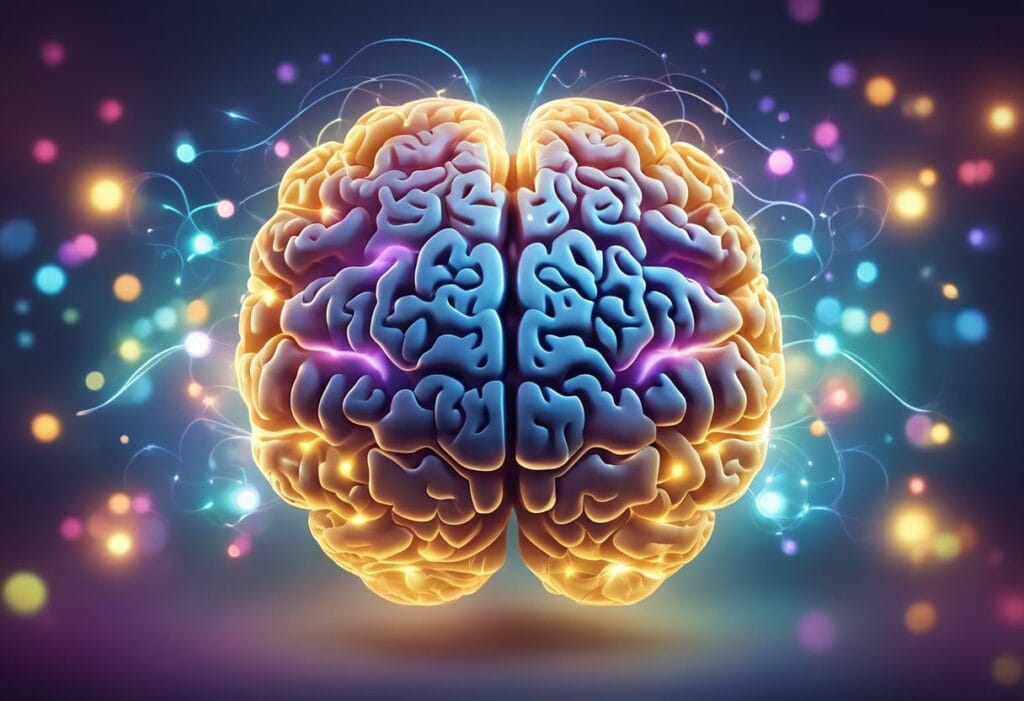Gratitude is a powerful emotion that has the potential to transform our lives and the lives of those around us. When we practice gratitude regularly, we experience greater well-being, joy, and satisfaction with life. But what is the science behind gratitude? Why does it have such a profound impact on our lives?

From a psychological perspective, gratitude is a positive emotion that arises when we recognize and appreciate the good things in our lives. It is closely related to other positive emotions such as joy, contentment, and satisfaction. According to research, practicing gratitude can improve our relationships, increase our resilience to stress, and enhance our overall sense of well-being.
Neurologically, gratitude has been found to activate regions of the brain associated with reward and positive emotion. When we experience gratitude, our brains release dopamine and serotonin, two neurotransmitters that are associated with feelings of happiness and well-being. This helps to reinforce the behavior that led to our gratitude, making us more likely to repeat it in the future.
Key Takeaways
- Gratitude is a positive emotion that can have a profound impact on our well-being and satisfaction with life.
- Practicing gratitude can improve our relationships, increase our resilience to stress, and enhance our overall sense of well-being.
- Gratitude activates regions of the brain associated with reward and positive emotion, releasing dopamine and serotonin.
The Psychological Perspective
Gratitude is a complex emotion that has been studied from various perspectives, including social psychology, positive psychology, and psychotherapy. In this section, we will explore the psychological perspective of gratitude, including its definition, impact on mental health, and role in psychotherapy.
Understanding Gratitude as an Emotion
Gratitude is a positive emotion that is experienced when we receive a benefit from someone or something. According to Emmons and McCullough (2004), gratitude is defined as a “positive emotional response that we perceive on giving or receiving a benefit from someone.” Gratitude is often accompanied by a sense of appreciation and thankfulness, which can lead to positive emotions such as joy, contentment, and happiness.
Gratitude and Mental Health
Research has shown that gratitude has a positive impact on mental health. Grateful individuals tend to experience more positive emotions and have a lower risk of depression and anxiety. This is because gratitude can increase the production of dopamine and serotonin, which are neurotransmitters associated with positive emotions and well-being.
Moreover, gratitude can help reduce stress levels by promoting positive emotions and reducing negative emotions such as resentment and envy. This can lead to better coping strategies and overall mental health.
The Role of Gratitude in Psychotherapy
Gratitude has also been found to be a useful tool in psychotherapy. In fact, gratitude-based interventions have been shown to be effective in reducing symptoms of depression and anxiety, and improving overall mental health.
One way psychotherapists can use gratitude is by encouraging their clients to focus on positive experiences and express gratitude for them. This can help shift their focus from negative experiences and emotions to positive ones, leading to improved mental health.
In conclusion, gratitude is a complex emotion that has a significant impact on mental health. By understanding gratitude as an emotion, we can better appreciate its benefits and use it as a tool in psychotherapy.
Neurological Foundations of Gratitude

Gratitude is more than just a warm feeling or a polite gesture. It has a profound impact on our brain chemistry and structure. By understanding the neurological foundations of gratitude, we can unlock the power of this emotion and use it to improve our mental health and well-being.
Gratitude and Brain Chemistry
Gratitude is associated with the release of several key neurotransmitters, including dopamine, serotonin, and oxytocin. These chemicals play a crucial role in our emotional and social lives, influencing our mood, motivation, and behavior.
Dopamine, for example, is often called the “feel-good” neurotransmitter because of its role in reward and pleasure. When we experience gratitude, our brain releases dopamine, creating a sense of happiness and satisfaction.
Serotonin, on the other hand, is linked to feelings of well-being and contentment. It helps us regulate our mood and emotions, and low levels of serotonin have been associated with depression and anxiety. Gratitude has been shown to increase serotonin levels, helping us feel more positive and resilient.
Finally, oxytocin is often called the “love hormone” because of its role in social bonding and attachment. It promotes trust and connection with others, and has been linked to feelings of generosity and compassion. When we experience gratitude, our brain releases oxytocin, strengthening our social bonds and enhancing our relationships.
The Impact of Gratitude on Brain Structure
Gratitude not only affects our brain chemistry, but also has a profound impact on brain structure. Studies have shown that practicing gratitude can increase the size and activity of certain brain regions, including the prefrontal cortex, the anterior cingulate cortex, and the amygdala.
The prefrontal cortex is responsible for executive functions like decision-making, planning, and problem-solving. Gratitude has been shown to increase activity in this region, enhancing our cognitive flexibility and creativity.
The anterior cingulate cortex is involved in regulating emotions and empathy. Gratitude has been shown to increase gray matter density in this region, improving our ability to regulate our emotions and understand the feelings of others.
Finally, the amygdala is responsible for our “fight or flight” response to stress and danger. Gratitude has been shown to reduce activity in this region, lowering our stress levels and improving our resilience to negative emotions.
In conclusion, the neurological foundations of gratitude are complex and multifaceted. By understanding how gratitude affects our brain chemistry and structure, we can harness the power of this emotion to improve our mental health and well-being.
Gratitude in Social Dynamics
Gratitude is not only beneficial to our mental and physical health, but it can also play a significant role in our social interactions. In this section, we will explore how gratitude can impact our relationships and social behavior.
Building Relationships Through Gratitude
Expressing gratitude towards others can help build and strengthen relationships. When we show appreciation for someone, we are acknowledging their value and the positive impact they have on our lives. This recognition can help foster a sense of connection and trust between individuals, leading to more positive interactions and a deeper level of intimacy [1].
One way to incorporate gratitude into our relationships is through a gratitude journal. By reflecting on the positive aspects of our relationships and expressing gratitude towards our loved ones, we can enhance our appreciation for them and strengthen our bonds [2]. This practice can also help us focus on the good in our relationships, rather than dwelling on negative aspects or social comparisons.
Gratitude’s Influence on Social Behavior
Gratitude can also have a positive impact on our social behavior. When we feel grateful, we are more likely to engage in prosocial behavior, such as generosity and compassion [3]. This is because gratitude can increase our sense of connection and empathy towards others, leading us to be more inclined to help and support those around us.
Furthermore, expressing gratitude can also lead to social recognition and validation. When we show appreciation for others, they may feel more valued and recognized, leading to a positive feedback loop of social support and kindness. This can also help foster a sense of community and belonging, as individuals feel more connected and appreciated within their social networks [4].
Overall, gratitude can play a significant role in our social dynamics, helping to build and strengthen relationships, and encouraging prosocial behavior and social recognition. By incorporating gratitude into our daily lives, we can enhance our social connections and foster a more positive and supportive social environment.
References:
- Algoe, S. B., & Stanton, A. L. (2012). Gratitude when it is needed most: Social functions of gratitude in women with metastatic breast cancer. Emotion, 12(1), 163–168. https://doi.org/10.1037/a0024024
- Seligman, M. E. P., Steen, T. A., Park, N., & Peterson, C. (2005). Positive psychology progress: Empirical validation of interventions. American Psychologist, 60(5), 410–421. https://doi.org/10.1037/0003-066X.60.5.410
- Bartlett, M. Y., & DeSteno, D. (2006). Gratitude and prosocial behavior: Helping when it costs you. Psychological Science, 17(4), 319–325. https://doi.org/10.1111/j.1467-9280.2006.01705.x
- Wood, A. M., Joseph, S., & Maltby, J. (2008). Gratitude predicts psychological well-being above the Big Five facets. Personality and Individual Differences, 45(5), 655–660. https://doi.org/10.1016/j.paid.2008.07.006
Practical Applications of Gratitude

Gratitude is a powerful tool that we can use to improve our well-being and overall happiness. Here are some practical applications of gratitude that we can incorporate into our daily lives.
Gratitude Exercises and Activities
Practicing gratitude exercises and activities can help us focus on the positive things in our lives and increase our overall well-being. Some examples of gratitude exercises and activities include:
- Writing down three things we are grateful for each day in a gratitude journal.
- Writing a gratitude letter to someone who has made a positive impact in our lives.
- Saying thank you to someone who has helped us or made us feel appreciated.
- Participating in positive activities like volunteering or donating to a charity.
These exercises and activities can help us cultivate a sense of gratitude and appreciation for the good things in our lives.
The Science Behind Gratitude Journaling
One of the most effective ways to practice gratitude is through gratitude journaling. Research has shown that keeping a gratitude journal can lead to increased happiness, improved relationships, and better physical health.
To start a gratitude journal, simply write down three things you are grateful for each day. This can be anything from a good cup of coffee to a supportive friend or family member. By focusing on the positive aspects of our lives, we can train our brains to look for the good in every situation.
In conclusion, practicing gratitude can have a profound impact on our lives. By incorporating gratitude exercises and activities into our daily routines, we can cultivate a sense of appreciation for the good things in our lives. Gratitude journaling is a simple yet effective way to practice gratitude and reap its many benefits.
Health and Well-Being Outcomes

Gratitude is not only a pleasant emotion but also has a significant impact on our physical and mental health. In this section, we will discuss the various health and well-being outcomes that have been linked to practicing gratitude.
Gratitude’s Effect on Physical Health
Research has shown that gratitude can have a positive impact on physical health. A study published in the Journal of Psychosomatic Research found that individuals who practiced gratitude had lower blood pressure and better sleep quality than those who did not practice gratitude. Another study published in the Journal of Personality and Social Psychology found that individuals who kept a gratitude journal had fewer symptoms of illness and exercised more regularly than those who did not keep a gratitude journal.
Enhancing Well-Being and Life Satisfaction
Practicing gratitude has also been linked to enhanced well-being and life satisfaction. A study published in the Journal of Positive Psychology found that individuals who practiced gratitude had higher levels of positive emotions, life satisfaction, and optimism than those who did not practice gratitude. Another study published in the Journal of Happiness Studies found that individuals who practiced gratitude had improved psychological well-being and experienced less depression and anxiety.
In conclusion, practicing gratitude can have a positive impact on our physical and mental health. It can lower blood pressure, improve sleep quality, enhance well-being, and increase life satisfaction. By incorporating gratitude into our daily lives, we can reap the benefits and improve our overall quality of life.










